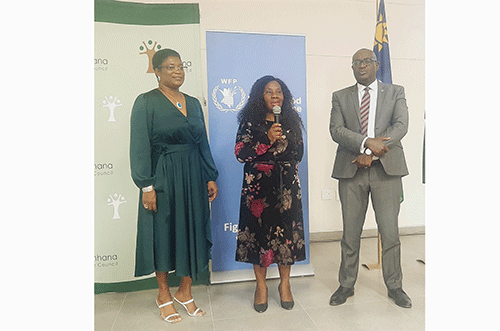EENHANA – Companies and individuals have pledged over N$300 000 in support of the first ever Ohangwena International Agri Food Confex.
The expo, which will be staged between 10-13 August this year at Eenhana, will see livestock and crop farmers, technology service providers, nutritionists and value addition providers taking part in the event.
This past Saturday, the Ohangwena Regional Council hosted a fundraising event, which saw government leaders, individuals and businesses pledging their support for the expo.
Speaking at the fundraising event, Minister in the Presidency Christine //Hoebes, who was a guest of honour, said a strong agricultural economy brings social progress by increasing productivity, employment and income.
“Agriculture is the main driver of development in most rural areas. Demand for staple foods, processed foods and agricultural commodities are increasingly growing in developing countries,” she said.
Furthermore, //Hoebes said the key deliverables of the expo include putting farmers first, ensuring a fair share of value chains and fair access to finance.
“Interventions such as these are embedded in the strong conviction of government to serve the Namibian people well through the crafting of an informal economy, start-up and entrepreneurship national policy through the Ministry of Industrialisation and Trade, with a view to providing the requisite framework for mainstreaming incentives and business infrastructure for SMEs,” said the minister who with her family pledged N$3 000.
Racheal Mhango from the World Food Programme said the Namibian agricultural sector is paramount and provides stable livelihoods to over 70% of the population and employs approximately 23% of the workforce.
“Therefore, strengthening our food systems should be an urgent priority for all stakeholders and development partners. We ought to engage communal farmers and poultry growers on production, value addition, commercialisation, and market access,” she said.
Mhango added Namibia is hard-hit by climate conditions and climate change challenges such as low rainfall.
Thus, she said, partners should connect farmers to climate smart interventions, technological solutions, drip-irrigation schemes while establishing rural cooperatives to ensure products from various groups reach the end buyer.
She said there is a need to introduce modern procurement systems and associated safety and quality procedures, while ensuring smallholder farmers are the main suppliers of produce since supermarkets predominantly own a majority of the value chain.
In his statement, Ohangwena governor Walde Ndevashiya said the expo will provide opportunities for participants and the general public to interact and interface with government agencies, consumers, policymakers, captains of industry, and representatives of food organisations, businesses, financial institutions and investors.
He added the smallholder producers will get an opportunity to exhibit, exchange information about new business opportunities, import, export, joint ventures, collaborations, create associations, unions, technology transfers, value addition through manufacturing and other various business activities in the agricultural sector.
“We want a conversation to explore innovative and transformation solutions to hunger and malnutrition, women’s rights, the marginalised and poorest, investment in smallholder farming and food sectors, ensuring public health outcomes linked to more diverse and nutritious food diets,” he said. fhamalwa@nepc.com.na



